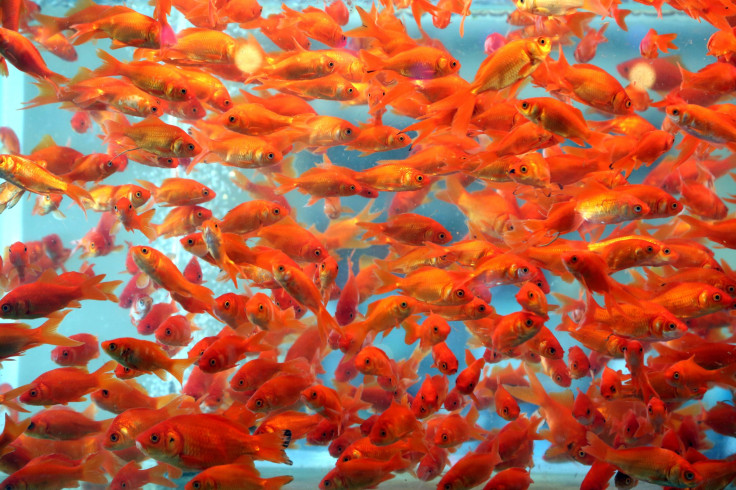'Monster' Goldfish: Canadian City To Use Pesticides To Eradicate Menace

A city in Canada used organic pesticides on waves of giant Asian goldfish after they invaded local ponds and threatened aquatic species for the past three years.
St. Albert officials used the chemical rotenone Tuesday to ward off the giant goldfish before they could spread to the Sturgeon River and disturb the ecosystem, the Toronto Metro reported. Rotenone is "naturally occurring compound" derived from plants and used to kill fish without threating wildlife or humans.
The large goldfish aren’t native to Alberta and have invaded the city’s Edgewater and Ted Hole stormwater facilities. The city planned to continue the chemical treatment through Oct. 20.
"I call them franken-fish," St. Albert’s environment director Leah Kongsrude told the Toronto Metro. "They’re really cute little goldfish in your little glass bowl, but you let them out and they turn into monsters."
'They turn into monsters': St. Albert launching third attempt to wipe out invasive goldfish https://t.co/S8VdWZvJtJ #yeg pic.twitter.com/i4836kdbqA
— Metro Edmonton (@metroedmonton) September 25, 2017
The fish are considered an invasive species and "extremely aggressive," and were introduced by people who dumped their pet fish in the stormwater pond, Kongsrude told the Metro. Goldfish grow into space they inhabit and can sprout to about 12 inches, Kongsrude said.
Locals first spotted the massive fish in the Edgewater Pond two years ago, when city crews attempted to scoop all the fish out with nets but couldn’t.
In Fall 2015, park officials partially drained the pond and hoped the remaining water would freeze, killing the rest of the fish. However, that didn’t happen, which caused the pesky goldfish population to increase.
"The battle goes on," Kongsrude told CBC News. "I think of zombie movies when I think about [how] we froze the storm pond right to the bottom and they survived through that, when we tried to electro-fish 'em it didn't do anything.
"We actually lowered the water level in the pond and we tried to make it so low that it would freeze right to the bottom in the winter, which we thought would kill them. But it doesn’t, apparently," Kongsrude said, according to the Metro. "In less than five years, they’ve been able to increase their numbers from two to thousands."
City to use pesticides on goldfish menace - St. Albert Gazette https://t.co/LclFch5alp pic.twitter.com/QEPxnrYG7B
— N. Sask. Riverkeeper (@saskriverkeeper) September 26, 2017
Goldfish populate quickly and can overwhelm native species, posing a threat to the stormwater ponds and the natural ecosystems of the Sturgeon River. The city tried other methods to control the fish population such as freezing them out last winter, which proved unsuccessful.
The city also tried "electrofishing," which failed.
"You put a current into the water and it basically stuns them and we try to remove them — but we turned up the volume on the electricity and they didn’t even blink," said Kongsrude.
St. Alberta urged people who no longer want their pet fish to dispose of them correctly, by either returning them to the pet store or burying them in the ground.
Goldfish cull underway at Edgewater Pond in St. Albert. About 1,000 in local storm water pond. pic.twitter.com/WNrmlK9KMh
— Zoë Todd (@ZoeHTodd) September 26, 2017
"The message is, don't let any of your fish or aquatic animals loose into the wild," Kongsrude said.
"Please take it back to the pet store," she added. "See if you can pass it along to anybody else. Please don’t release it into the wild, anywhere."
© Copyright IBTimes 2024. All rights reserved.











